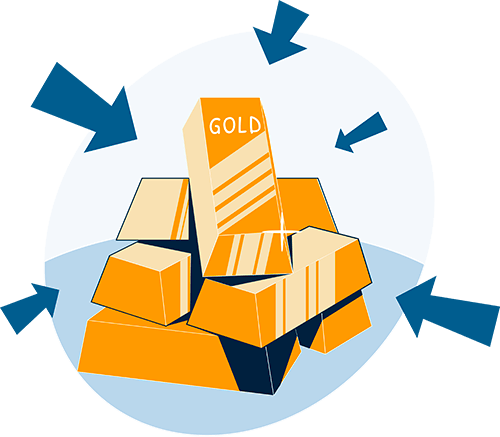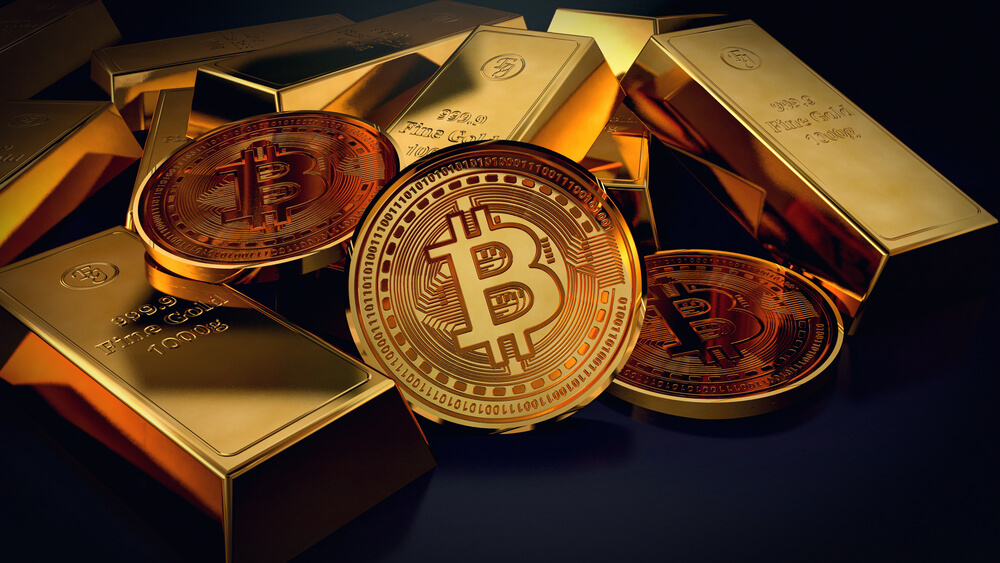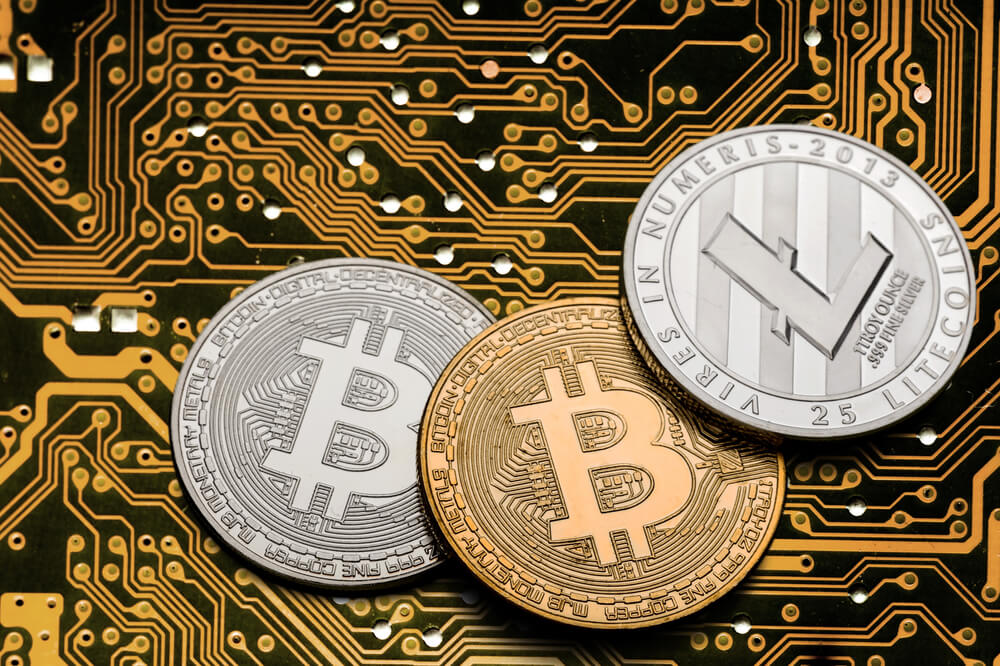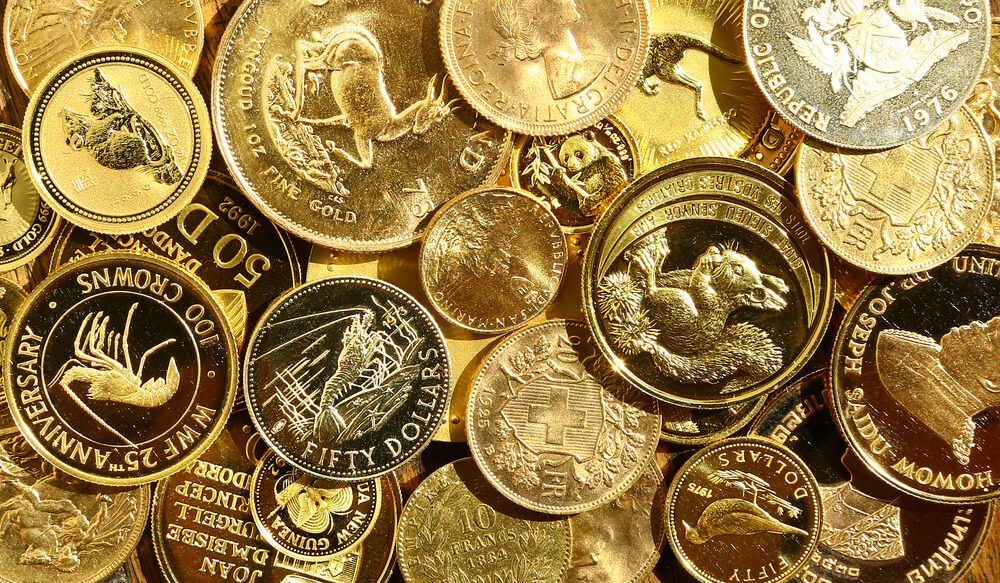
Gold vs. Bitcoin: Where Should I Invest My Money?
Gold has been the de facto store of value for people who want to safeguard their finances or hedge against inflation. The precious metal has a finite supply or is available in a limited amount. The fixed supply has considerably boosted its value over the years. The economic standing of gold is so strong that central banks and other financial institutions hoard up on gold to be in good stead when the bull market goes sluggish.
Bitcoin is a digital currency dubbed “digital gold” by cryptocurrency enthusiasts. It’s a form of Internet cash that’s not tied to a bank or the federal government. It’s decentralized, just like no particular entity has direct or sole control over gold.

Due to the similarities between gold and bitcoin, traditional gold investors are increasingly looking at bitcoin as an alternative to the yellow metal. On the other hand, millennials believe bitcoin is more futuristic and has more growth potential than gold.
If you’re someone on the fence about investing in bitcoin and/or gold, this is the article you need. For your complete understanding, we’ll cover the following:
- A proper overview of bitcoin (how it works; what bitcoin mining and nodes are)
- The number of bitcoins in circulation and how many more bitcoins to expect in the future
- The similarities and differences between gold and bitcoin
- And should you invest in bitcoin or gold? And more
Although bitcoin has been around since 2009, it’s still not a household topic, or people do not understand the cryptocurrency the way they are familiar with gold. We have, therefore, focussed primarily on bitcoin in this write-up to give you more than a basic understanding of it.
Table of Contents
Bitcoin: A Complete Overview
Bitcoin is one popular financial instrument most people haven’t been able to wrap their heads around despite the cryptocurrency being around since January 2009. If stocks and mutual funds are complicated topics, bitcoin takes that complexity to a higher level.
So, what is called bitcoin? Bitcoin is a cryptocurrency or a form of digital currency. A cryptocurrency is any electronic money that serves as an alternative to fiat currency. A cryptocurrency is decentralized or is not controlled by a central bank.
There are different cryptocurrencies — Ethereum, Litecoin, Cardano, etc. Bitcoin is undoubtedly the most popular of them all, and the term is pretty much synonymous with cryptocurrency.
Read more: Precious metals investing
How Does Bitcoin Work?
Paper currency is valuable because it’s issued and backed by the state. Bitcoin has no backing of any government since it’s based on a decentralized structure that lets it exist past the power of the state and central authorities. Bitcoin also doesn’t have a network of banks endorsing or promoting its use.
That decentralized cryptocurrency structure might sound simple on paper. But in actuality, the infrastructure requires truckloads of machinery to function. In other words, there’s no single computer maintaining the ledger balance, unlike how banks administer digital currency. That means you’ve got complete control of your bitcoins, or no institution or government can confiscate or block your bitcoin wealth.
Bitcoin also eliminates the middle entity usually associated with traditional money transactions. That means it’s inexpensive, or you won’t be paying commissions to a third party on a trade, which is usually the case with money orders or wire transfers.
What is Bitcoin Mining?
Bitcoin mining helps new bitcoins enter circulation after verifying the legitimacy of the transactions. It is a method through which the blockchain network confirms recent transactions.
The mining side of the process employs modern hardware capable of solving highly complex computational math. The computing power required for verifying transactions and mining new bitcoins, called “hash rate”, increases or becomes difficult as more bitcoins are generated.
GPUs and ASICs (application-specific integrated circuits) solve those math problems. An ASIC is essentially a microchip made specifically for bitcoin mining.
Initially, the CPUs in regular computers were good enough to mine bitcoins. As mining became difficult, the bitcoin network employed GPUs. A GPU’s mining power is equivalent to 30 CPUs.
Then came FPGAs (field-programmable gate arrays), which can be hooked on to a bitcoin mining computer. An FPGA’s functionality is similar to a GPU, but it’s around three to 100 times more capable. However, configuring an FPGA is not as simple as setting up a GPU.
The arrival of ASICs in 2013 changed that significantly and gave bitcoin’s computing network a massive edge over all kinds of computing devices around.
What are Nodes?
Bitcoin needs more than just mining hardware to validate and relay transactions. The miner must broadcast information across a network with the help of “nodes”.
Nodes are essentially bitcoin software-running computers, critical to bitcoin’s decentralized setup. Several thousand bitcoin nodes exist, which eliminate the possibility of an individual or a group manipulating the bitcoin system.
Nodes help secure the bitcoin network. Randomly selected nodes help reduce the double-spending problem when someone spends a bitcoin twice—the more active nodes in a network, the greater the network’s security levels.
How Many Bitcoins are Currently in Circulation?

Contrary to what some people not familiar with bitcoin think, bitcoin’s total supply is fixed. Unlike fiat currencies, you cannot mine bitcoins at will, or the current supply remains disproportionately low by design.
Satoshi Nakamoto, the inventor of bitcoin, has capped the bitcoin number to 21 million indefinitely. As of August 2021, there are 18.7 million bitcoins in circulation, with the remaining 2.3 million not mined yet.
New bitcoins enter circulation at the rate of one block every 10 minutes. A block is a file that contains permanently recorded information about a bitcoin transaction. In a given transaction, one or more bitcoins may enter the flow.
The number of bitcoins that enter supply via each block is decreased by 50% once every four years. The supply cap is one of the hallmarks of bitcoin, or it controls inflation, which could arise from an unlimited supply.
Gold and Bitcoin: The Vague Similarities
As mentioned earlier, bitcoin is considered “digital gold”. The following are some significant reasons why parallels are drawn between bitcoin and gold.
Extremely Difficult to Fake
Gold can be diluted with other metals or wholly faked. But it’s easy, or there are techniques to differentiate pure gold from others. In other words, fake gold cannot be passed off as real gold. With online gold, that is even truer.
Like the yellow metal, you cannot duplicate bitcoins too. Moreover, mining new bitcoins is pretty much as difficult as (if not more) mining gold.
Rare Commodities
Both bitcoin and gold are naturally rare. Also, there’s only so much gold and bitcoin that one can mine. While no cap has been set on gold’s total natural supply, unlike bitcoin, it is common knowledge that there’s only so much fresh gold humans can mine.
As of 2021, there are approximately 18.9 million bitcoins in circulation. The remaining 2.1 million bitcoins are yet to be mined. It’s estimated to take more than 100 years to mine the yet-to-be-made-available bitcoins.
Hedging and Diversification Tools
Both bitcoin and gold are hedge tools, or they have an inverse or weak relationship with the dollar. You can use either the precious metal or the digital asset to safeguard against inflation or further portfolio diversification.
Should You Invest in Gold or Bitcoin?
Whether it’s bitcoin or gold, you should never invest in any asset that you have no clue about or do not understand how it works. Since bitcoin, or cryptocurrency in general, is so outside a layperson’s comprehension, we felt the need to deep-dive into the topic and not just define the term in a few sentences.
So, who wins the bitcoin vs. gold battle for your investment cash? You could invest in both or either. The following are a few points of distinction between the two that may help you devise your investment strategy:
- Historicity: Gold has a long history or has been around for ages — as gold jewelry, gold coins, bullion, etc. It has served as the means through which investors secure their purchasing power and diversify risks for decades. Bitcoins are relatively recent and nowhere comparable to gold’s history and pedigree.
- Tangibility: You can see and feel gold. Bitcoins are digital currencies that exist online only. If you like to see and feel your investments, such as real estate, bitcoin may not be for you.
- Complexity: Gold requires no introduction. Almost every adult, investor or otherwise, is familiar with gold. Unlike gold, bitcoin is an emerging asset class, and most people do not truly understand how it works. You require technical or technological knowledge to learn about blockchain-based cryptocurrency and its economic activity.
- Volatility: Both bitcoin and gold go up and down in value. Compared to bitcoins, however, gold is far more stable. Moreover, external factors easily affect or influence bitcoin’s price. Gold, in that regard, is pretty siloed and steady.
- Accessibility: Both gold and bitcoin are expensive purchases. One bitcoin is $48,000 approximately (as of December 2021). The good news is you could buy bitcoin in constituents. But you cannot purchase it via a bank or some other financial organization.
If preserving wealth is your primary goal, gold is the right choice. Compared to bitcoin, there’s less risk attached to the yellow metal. Most importantly, gold will never be zero in value. On the other hand, bitcoin is recommended if you have disposable income and would like to subject those funds to bitcoin’s erraticness.
There’s no doubt a more significant risk attached to the cryptocurrency. But it’s imperative to understand that bitcoin is a reasonably new phenomenon and is likely to go up in value with time, particularly when you consider that it will be in limited supply.
Read more: Best gold IRA companies
Conclusion
Bitcoin might be the new gold or ultimate currency for millennials and later generations. But it’s critical to acknowledge that gold has been around for ages and has proven its ability to safeguard investors from inflation time and again or serve as a haven. Bitcoin has not showcased any such ability yet. Not to mention, bitcoin is a highly complex form of digital currency.
To conclude, if you’re feeling adventurous and want to take the cryptocurrency ride, go ahead and invest in bitcoin. Not to mention, the potential returns on bitcoin could be enormous. But if, on the other hand, your risk appetite is low and you don’t have the time and aptitude for learning about bitcoin, stick with gold.
It won’t be impolitic to say investing in bitcoin with insufficient knowledge about how it works is akin to gambling.


